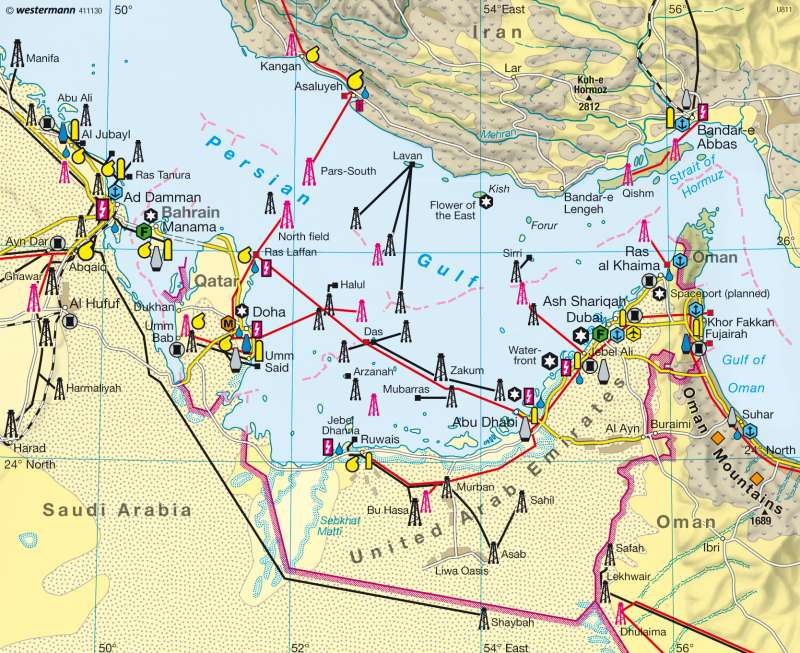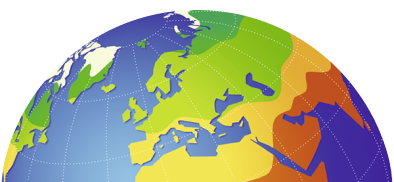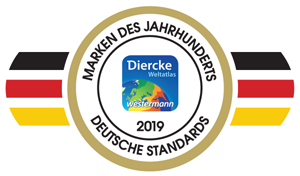Arab States of the Persian Gulf — Economy
Persian Gulf region
978-3-14-100790-9 | Page 104 | Ill. 2

Information
Although situated in a strategically important region, as a body of water the Persian Gulf is comparatively unspectacular: a gentle syncline with not very prominent amphibian shores, a broad continental shelf and an average depth of from 35 to a maximum of 110 metres. Just 20,000 years ago the trough was filled up again through the Straits of Hormuz with water from the Indian Ocean, which is completely exchanged after three to six years due to the high rate of evaporation and has a salt content of some 4 percent. The ecological balance in the Gulf is threatened mainly by the low influx of fresh water, which comes almost exclusively from the Euphrates and Tigris Rivers, by pollution due to sewage from the coastal cities, and by oil pollution, caused for example by tanker accidents, the burning of the Kuwaiti oilfields in 1990/91, or the petrochemical industry.Oil and Natural Gas Deposits
The trough, which has been scarcely disturbed at all by tectonic activity in the last few million years, has — due to underground microtectonics (especially salt tectonics) — folded anticlines of Jurassic and Cretaceous chalks and limestones near the surface, covered by impermeable clay sediments. Liquid and gaseous hydrocarbons that came into existence in the Cambrian period migrated into these "traps". Where these deposits are large enough, and when they are discovered by oil and natural gas exploration, production can start. The associated materials — natural gas (upper), oil (middle) and water (lower) — come to the surface in the drilling probes from a depth of 1,000 to 2,000 metres under their own artesian pressure.
The natural geographic situation with its weak tectonics has given the Gulf a unique treasure. The territories of the Gulf littoral states including Iraq, Iran and Kuwait hold 52 percent of the world's reserves of oil and natural gas. Even taking into account all of the world's other energy raw materials, mainly coal, 21 percent of proven global energy reserves are located here. If one considers only the countries shown in the map section, the figure is 13 percent. Not only the quantities are decisive, but also the price: nowhere in the world are the extraction costs so low. In the Gulf these are estimated to be 4 US dollars per barrel or 30 US dollars per ton; for coal from the Ruhr with a comparable calorific value, some 250 US dollars per ton must be spent.
Territorial Conflicts in the Gulf
A sectoral and a geographical division of labour exists in the energy market. In sectoral terms, crude oil — when it is not refined for domestic use — is mainly sold for export. In contrast, natural gas — which is more expensive to transport — is the real motor of development. It is the raw material for the petrochemical industry, and fuels the electricity and seawater desalination plants that make survival for the peoples of the Gulf possible. The treasure-house of energy makes the region important and valuable, but also vulnerable. Across the Straits of Hormuz, through which 32 percent of world crude oil exports are transported, Semitic Arabs and Indo-European Iranians face one another. Although both ethnic groups are united by Islam, there has been a deeply-rooted aversion between Arabian Sunnis and Iranian Shiites since the Battle of Karbala, which was fought between the Umayyad and the Shiites in 680 A.D.
Today, some 34 million inhabitants live in the littoral states of the Arabian Gulf (excluding Iraq); after deducting foreign guest workers, the figure falls to 22 million. Against these there are nearly 71 million Iranians — not guest workers, but citizens of a well-equipped state apparatus that is outwardly united despite all internal political disagreements. Iran abandoned its territorial claim on today's Kingdom of Bahrain in 1970, at least formally, but in 1971 it occupied a number of islands belonging to the Arab Emirate of Sharjah (Ash-Shariqah). Even today the Arab side feels vulnerable and therefore desperately seeks allies such as the USA.
K. Schliephake; Ü: J. Attfield




